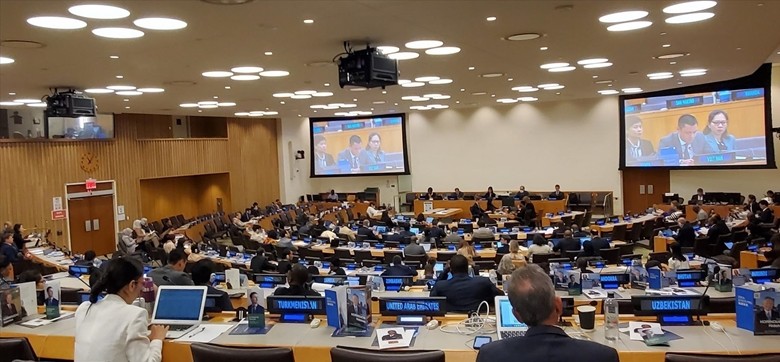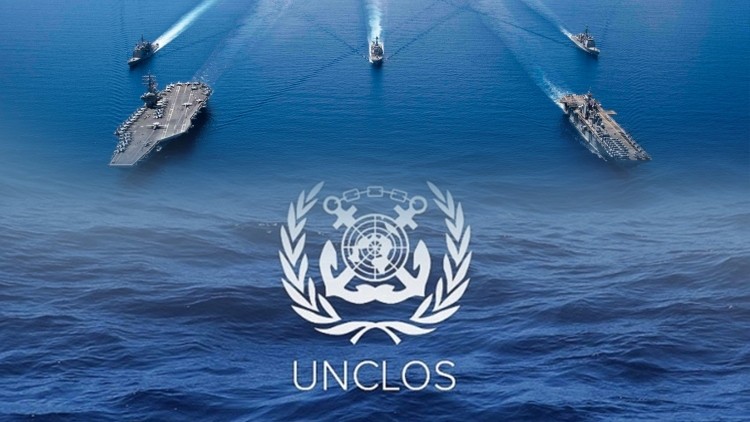
Determination to protect the Fatherland's sovereignty over the sea and islands (article 2):
UNCLOS 1982 - Establishing and strengthening the legal order at sea, maritime cooperation for peace and sustainable development
Latest
 |
| The 33rd Conference of States Parties to the United Nations Convention on the Law of the Sea in 1982 - UNCLOS (6/2023). (Photo: QT) |
Vietnam actively participates and implements UNCLOS
Considering and understanding the legal factors in implementing the 1982 United Nations Convention on the Law of the Sea (UNCLOS) is something that needs attention in the context of Vietnam and other countries around the world strengthening cooperation in maritime fields at national, regional and international levels; promoting the maintenance and consolidation of peace; conservation and sustainable use of oceans, seas and marine resources, including international cooperation to preserve marine biodiversity and combat ocean plastic pollution, in order to implement the Sustainable Development Goals stated in the UN's 2030 Agenda as well as implement the National Action Program of Vietnam on sustainable development.
The year 2023 marks the 41st anniversary of UNCLOS being approved by the 3rd UN Conference on the Law of the Sea and signed by Vietnam along with many other countries in Montego Bay, Jamaica (December 10, 1982-2023). At the same time, it marks 29 years since UNCLOS was ratified by the National Assembly of Vietnam (June 23, 1994) and began to take effect for Vietnam and other countries that have ratified the Convention (November 16, 1994).
The year 2023 also marks 21 years since ASEAN countries and China adopted the Declaration on the Conduct of Parties in the East Sea (DOC) (November 4, 2002) and 11 years since Vietnam's Law of the Sea was adopted by the National Assembly (June 21, 2012).
Vietnam is constantly making efforts with countries that have actively promoted the implementation of UNCLOS, being one of the 12 founding countries to establish the UNCLOS Friends Group (June 30, 2021), to create and maintain an open and friendly forum for countries to exchange issues on the seas and oceans, thereby contributing to the full implementation of UNCLOS, including the work of UNCLOS member national conferences. Vietnam has participated in the negotiation process of UNCLOS and international legal documents within the framework of UNCLOS, being one of 107 countries that signed UNCLOS on December 10, 1982 immediately after the Convention was passed and began to be opened for signing.
Vietnam's active participation and implementation of UNCLOS demonstrate goodwill, consistent views and policies, Vietnam's respect and expectation for a fair legal order on the sea, in order to promote international cooperation at sea, for peace and sustainable development. Point 2 of the National Assembly's Resolution on ratifying UNCLOS clearly states: "By ratifying the 1982 United Nations Convention on the Law of the Sea, the Socialist Republic of Vietnam demonstrates its determination to join the international community in building a fair legal order that encourages development and cooperation at sea”.
 |
| UNCLOS is respected and recognized by countries and the international community as the second important international legal document after the UN Charter. (Photo: QT) |
A comprehensive legal framework for seas and oceans
UNCLOS is respected and recognized by countries and the international community as the second important global international legal document after the UN Charter, developed and completed by countries after World War II and participated by a large number of countries.
The annual general resolution of the UN General Assembly on Oceans and the Law of the Sea reaffirms: This Convention is the legal framework regulating all activities on the seas and oceans and is of strategic importance as the basis for all actions and cooperation on the sea at national, regional and global levels; The integrity of the Convention needs to be maintained as recognized by the United Nations at the Conference on Environment and Development stated in Chapter 17 of Agenda 21… as well as the commitment to conservation and sustainable use of the ocean, sea and marine resources for sustainable development stated in Goal 14 of the 2030 Agenda.
Right in the Preamble of UNCLOS, countries affirmed their desire to "resolve all issues related to the law of the sea" and "establish a legal order at sea".
Stemming from that common desire, UNCLOS, with 320 Articles and 9 Appendices, clearly and comprehensively stipulates the legal status of sea areas within national jurisdiction and beyond countries, as well as the rights and obligations of countries whether maritime, landlocked or geographically disadvantaged in the use, exploitation and management of seas and oceans, regulations on goods maritime and aviation; the use and management of marine resources including living and non-living resources; issues of marine environmental protection, marine scientific research, security and order at sea; dispute resolution and international cooperation on the sea.
The role of UNCLOS as the highest global legal framework is also affirmed in Article 311 on the relationship between UNCLOS and other international conventions and agreements, as well as in Article 293.1 regarding relations with other sources of international law, including customary international law.
States have affirmed in UNCLOS that international treaties between two or more UNCLOS member states on any matter specified in the Convention must ensure compliance with the Convention. Regarding the relationship between UNCLOS and other sources of international law, including customary international law, only rights and obligations formed from rules of international law that are not contrary to UNCLOS are recognized and imposed by a competent court or tribunal under Part XV of the Convention (Article 293.1).
UNCLOS in Paragraph 8 of the Preamble also states that: ‘matters not regulated by the Convention will continue to be governed by general international law’ need to be understood and interpreted in accordance with the above objectives and regulations of UNCLOS.
* Head of the Permanent Mission of Vietnam to the United Nations (UN), WTO and other international organisations in Geneva.









